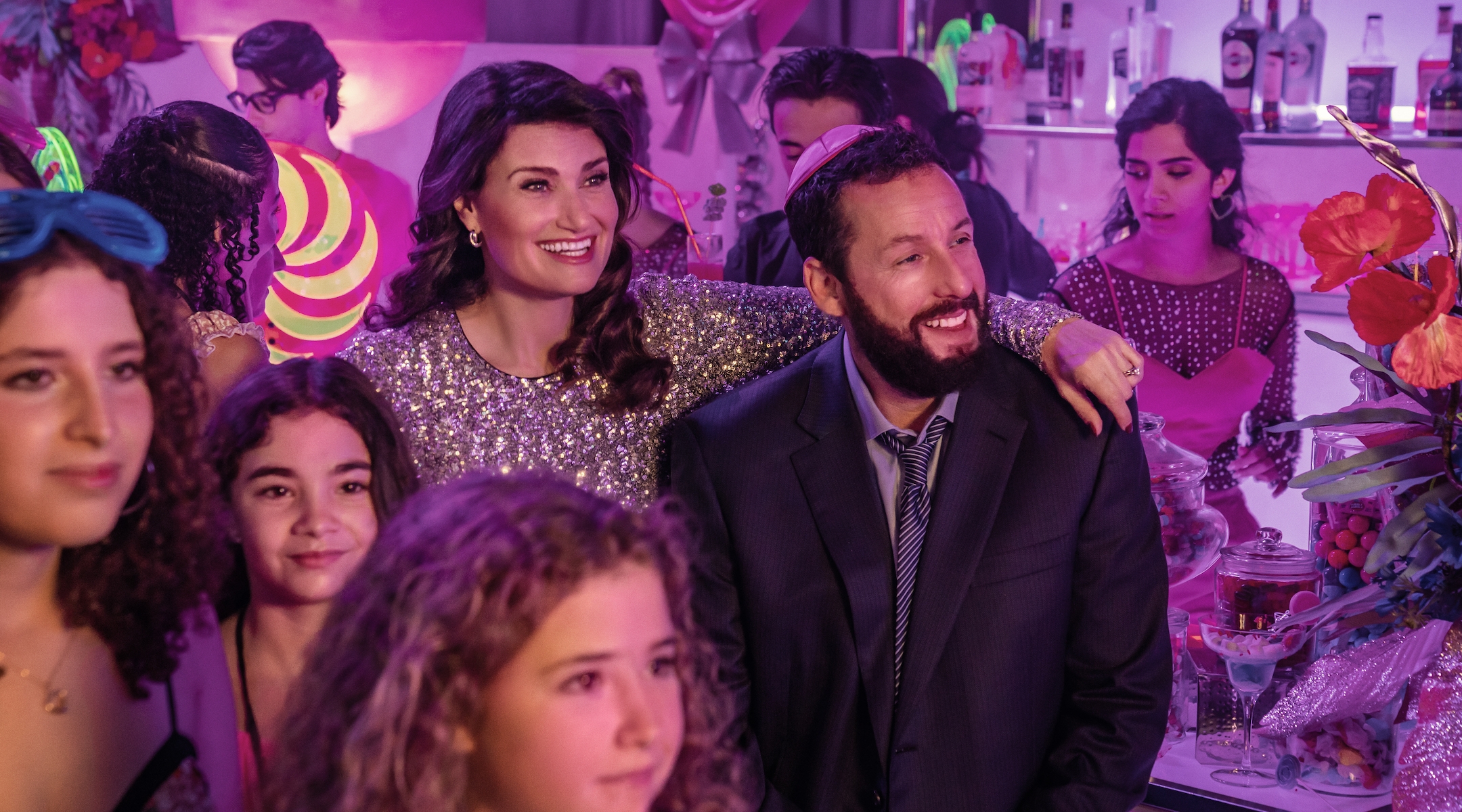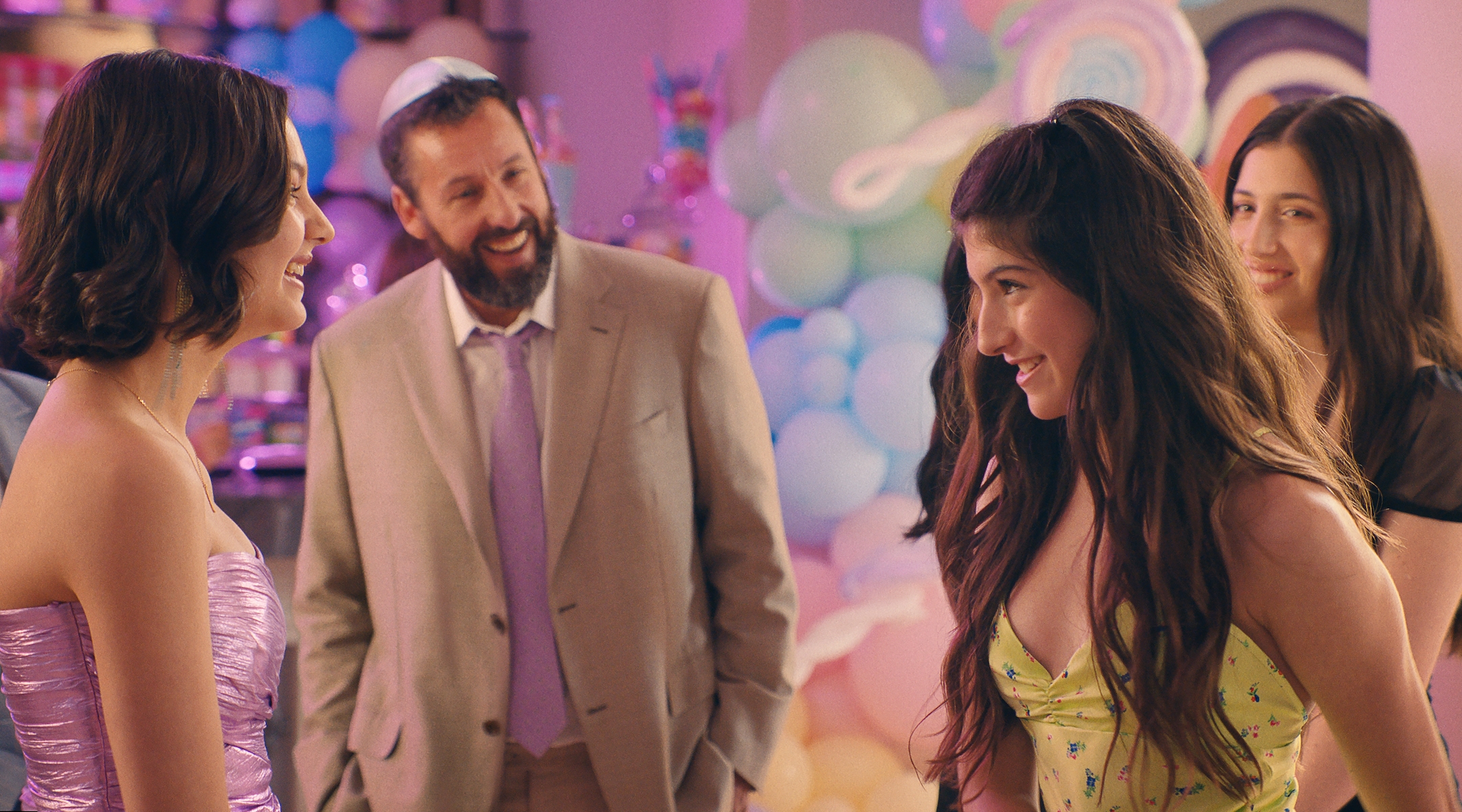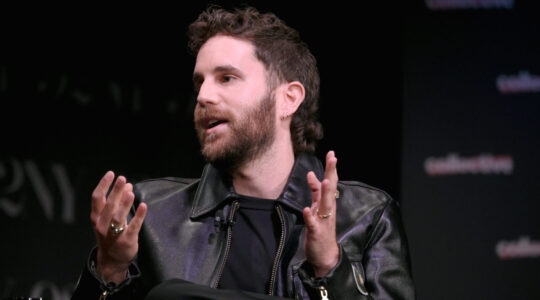(JTA) — To prepare for their role in creating Adam Sandler’s latest movie, crew members hit the Toronto bar and bat mitzvah circuit.
Production designer Perry Blake and set decorator Julia Altschul, guided by a local consultant on the Jewish coming-of-age ceremony, crashed 10 parties within a matter of weeks.
“We saw how amazing and big and outlandish and extravagant they were,” Blake told the Jewish Telegraphic Agency. “With a movie, you usually set your sights high — bigger than the real world. But that was like, wow, the real world is really amazing.”
The team borrowed several features from the events they attended, from 30-foot-wide videos honoring the bar and bat mitzvah celebrants to costly DJs to fanciful lighting displays. All of those led to the lavish sets in “You Are So Not Invited to My Bat Mitzvah,” which hits Netflix on Friday.
One circus-themed party inspired the dazzling Carnivale-themed bar mitzvah that opens the film, complete with a fire-breather and stilt walker.
“We actually hired one of the people who was working at this circus bar mitzvah to be in our movie,” said Altschul. “She was a stilt walker and she had different outfits. So at the circus bar mitzvah she was a bearded lady and then at ours, she was this really amazing, flamboyant butterfly girl.”
The world of extravagant, euphoric and angst-charged parties for 13-year-olds is the setting of Sandler’s new comedy, a coming-of-age drama that is also an onscreen vehicle for his real-life Jewish family. Sandler plays the befuddled, uncool dad Danny Friedman to Stacy and Ronnie Friedman, portrayed by his real-life daughters, Sunny and Sadie Sandler, while his wife Jackie Sandler has a smaller role as the mother of Stacy’s best friend Lydia.

Idina Menzel, Sandler’s co-star in “Uncut Gems,” reunites with him for “You Are So Not Invited To My Bat Mitzvah.” (Scott Yamano/Netflix)
The friendship between Stacy and Lydia makes up the backbone of the film, which is based on Fiona Rosenbloom’s 2005 book of the same name. The two girls start out planning their dream bat mitzvah parties together, but a rift over Hebrew school stud Andy Goldfarb (Dylan Hoffman) threatens to destroy both their friendship and their Jewish rites of passage.
Sandler has previously appeared in movies with Jewish themes, including the comedy “You Don’t Mess With the Zohan,” about a legendary Israeli soldier who dreams of becoming a hairstylist, and acclaimed dramas “The Meyerowitz Stories (New and Selected)” and “Uncut Gems.” (The Jewish actress Idina Menzel starred opposite Sandler in “Uncut Gems,” a crime thriller about the diamond business, and again plays his character’s wife in the new film.)
But none of those stories portrayed a centerpiece of Jewish family life so thoroughly, and so earnestly. “You Are So Not Invited to My Bat Mitzvah” shows Stacy practicing her Torah portion; agonizing over her “mitzvah project,” a service initiative that many congregations encourage; and meeting with her hipster, often-on-the-treadmill rabbi, played by comedian Sarah Sherman. (The movie, directed by Sammi Cohen and written by Allison Peck, filmed in part at a real Toronto Conservative synagogue, Beth Tzedec.)
For Stacy, Lydia and their friends, the point of the milestone is the party. The movie explores the intense pressure that families, especially in affluent communities, can face to throw the best-ever bash. Bar and bat mitzvah parties in the United States can cost between $10,000 and $40,000, or upwards of $100,000 for families in New York City and Los Angeles, according to The Bash, an event-planning platform — though the price tag can easily rise higher for families that choose pricey venues and entertainment. One 2015 celebration in New Jersey that featured teen idol Nick Jonas reportedly topped $1 million.
Sandler’s character battles back against the pressure. After Stacy demands a private yacht on the Hudson River and pop star Olivia Rodrigo on a jet ski, her father responds: “When I got bar mitzvahed, we had a party in Grandma’s basement. We all split this giant matzo ball. That was the fun. You know what the theme was? Being Jewish!”
The greatest challenge for crew members was packing all the splendor of real sprawling festivities into brief shots, said Altschul.
“A real bar or bat mitzvah is hours,” she said. “So we’re trying to get people to see all the bits and pieces — speeches, a video, the grand entrance, candle-lighting, the swag, the full picture — in a quick minute or two.”
One coming-of-age party in particular fueled the crew’s imagination: star Sunny Sandler’s real-life bat mitzvah, which took place in Los Angeles just a few months before the film started shooting. Blake attended the ceremony and the celebration along with Cohen and Peck.
“That was Adam Sandler’s daughter, so it was pretty over-the-top, too,” said Blake.
The event was notable not only for its famous attendees, including Jennifer Aniston, a close family friend, and Jewish director Judd Apatow, who is Sandler’s former roommate. Like the fictional party at the climax of the film, Sunny Sandler’s bat mitzvah was Candyland-themed. Blake took photos of its impressive candy buffet and pink-and-purple color scheme, which directly inspired the movie set.
The crew worked with Heather Glowinsky, the proprietor of Rockpaper Events in Toronto, to sample other glitzy celebrations. But though the crew had fun building elaborate party scenes, they said they also sought to convey the significance of a ritual that unites Jewish families.
“The coolest thing was just seeing that it’s so much about family,” Blake said. “Just seeing the old grandma table with one kid there, or the parents all hanging out and they just know each other, and all the kids know each other from going to Hebrew school.”
Altschul, who has a Jewish father but did not have a bat mitzvah celebration herself, said the bar-and-bat-mitzvah-crashing season made her rethink her own connection to Jewish tradition.
“I realized how much I know about being Jewish,” she said. “I really didn’t consider myself so Jewish, and then I realized that my grandma and my dad had actually instilled so many things in me. So that was a nice discovery.”
JTA has documented Jewish history in real-time for over a century. Keep our journalism strong by joining us in supporting independent, award-winning reporting.






